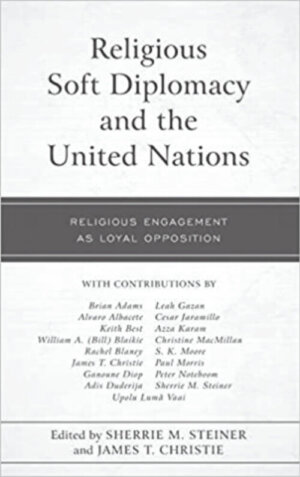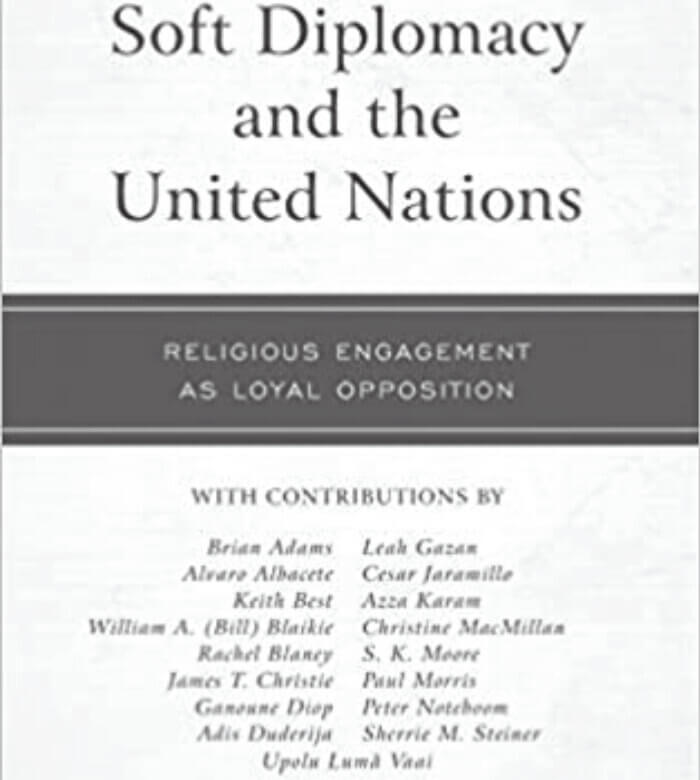Religion Finding a Sense of Direction in This Transformative Moment in History
Book Review by Douglas Roche, Edmonton
Volume 35 Issue 7, 8 & 9 | Posted: October 4, 2021

Religious Soft Diplomacy and the United Nations: Religious Engagement as Loyal Opposition, Eds: Sherrie M. Steiner and James T. Christie, Lexington Books, London, 2021.
Given the calamitous twentieth century and the devastating opening of the twenty-first, can we imagine a future of any goodness? The tentative answer by the editors of this challenging book on the influence of religion on world affairs is yes. They put their trust and hope in what President Abraham Lincoln called “the better angels of our nature.”
There’s a lot speculation these days on what the post-pandemic world will look like. Will the human community assimilate the lessons presented by the COVID-19 tragedy? Will we embrace the oneness of the human community? Will we adopt a posture of inclusive, progressive internationalism? Or will we sink once more into a narrow, exclusive and tribal nationalism?
Religion is already contributing, however modestly, to finding a sense of direction at this transformative moment in world history. But this contribution will only be effective if the religious voice speaks to justice, peace, inclusion, and global community, and shows itself to be a “loyal opposition” to the principalities and powers of this very fragile planet.
The editors, Sherrie M. Steiner, sociology professor at Purdue University, Fort Wayne, Indiana, and James T. Christie, a United Church minister who has a long record of service to the ecumenical movement in Canada (he was president of the Canadian Council of Churches from 2006 to 2009) build a strong case for this powerful proposition: “The voices of religion and spirituality must be addressed to the peoples of the world in its only global assembly extant, the United Nations.”
The nineteen-chapter authors address this theme from scholarly and practical perspectives.
First, though, the editors recognize that religion does not come to U.N. discussions with clean hands, for it has had “a propensity to incite, cultivate, and practice violence on a grand, if not cosmic, scale.” Think Christian-Muslim antagonism, Israeli-Palestinian hatred, Catholic-Protestant battles. The list is long. Thus religion today, which aspires to a human rights agenda, has a crisis of legitimacy.
So religion has to get its own house in order before telling the U.N. what to do. The first step is the adoption of some humility. As we learn to love the world as God does, the editors write, we see neighbours of other faiths as fellow children of the living God. The Parliament of the World’s Religions has fostered respect for diverse religious traditions and promoted a global ethic, originated by Hans Küng, who held: “There will be no peace among nations without peace among religions; there will be no peace among religions without dialogue among religions.”
A practical application of the newly proclaimed global ethic emerged in a new dialogue between religious leaders and the political and economic leaders of the G7 nations. Expansion to the G20 (the world’s most powerful economic states) followed, and these “summits” of religious and political leaders morphed into analysis of how to implement the Sustainable Development Goals, the vast U.N. program aimed at eroding the worst forms of poverty by 2030.
Out of these efforts was born the King Abdullah International Centre for Intercultural and Interreligious Dialogue (in which the Vatican participates). The U.N.’s annual International Week of Religious Harmony is one of the fruits of this interfaith dialogue.
The book argues that there is taking place a gradual maturation of global religions from parochialism to planetary community. Thus they now have greater credibility in arguing, as Cesar Jaramillo, executive director of Project Ploughshares, does in his chapter that “nuclear weapons are a crime against God and humanity.” Nor can it be said that the moral and ethical condemnation of nuclear matters is just a Christian issue.
Many of the world’s traditions share this profound concern about the survival of humanity and all of God’s creation. Similarly, spiritual concern about the devastating effects of climate change expresses itself in what Upolu Luma Vaai, a Fiji scholar, calls “eco-relational spirituality.” Here, balance and harmony are not just romantic notions but intergenerational principles designed to protect Earth from greed and individualism.
Though its internal wars have by no means disappeared, religion, at least the best of it, is now trying to “speak truth to power.” In that sense, it opposes policies that further exacerbate the inequalities in the world. Instead of shouting epithets, religion today knocks on the door of the U.N., pleading on behalf of vulnerable people and a stressed planet.
“If anyone answers,” the editors write, “we will come in, not to convert or control” but to “collaborate and converse.”
The goal of such efforts beckons. “Perhaps our willingness to be God’s servants in and to the world will legitimize the U.N. at least as much as the U.N. legitimizes us.”
Former Canadian Senator Douglas Roche’s latest book is “Recovery: Prospects for Peace in the Biden Era”.
Book Review by Douglas Roche, Edmonton

